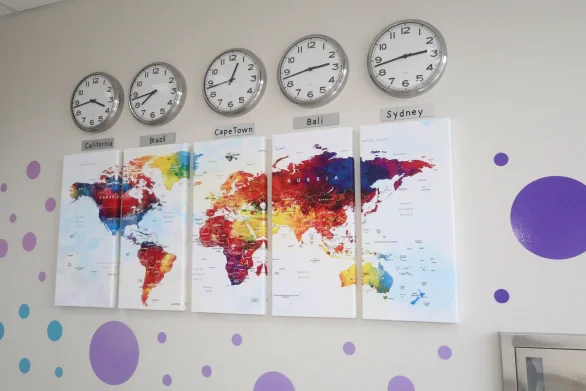Kodeclik Blog
Converting UTC to local time in Python
Let us learn how to convert UTC to local time in Python. But first what is UTC?
UTC (Coordinated Universal Time) is the primary time standard by which the world regulates clocks and time.
It is important to note that UTC itself is not a timezone, but a time standard. However, there are offsets from UTC that are used to define time zones around the world. For instance, UTC-8:00 is Pacific Standard Time (PST). Similarly, UTC-5:00 is Eastern Standard Time (EST). Finally, UTC+5:30 is India Standard Time (IST) and so on.
It is important to note that, unlike standard time zones, UTC does not change with seasons. When a region observes Daylight Saving Time (DST), its offset from UTC changes, but UTC itself remains constant. For instance, during DST, Eastern Time in the US becomes EDT (Eastern Daylight Time), which is UTC-4 instead of the standard UTC-5 (as described in the paragraph above).Thus, the actual time difference between a local time zone and UTC may vary depending on the time of year.

UTC is widely used in scientific, aviation, and international communications to avoid confusion caused by different local time zones. For example, amateur radio operators often schedule their contacts using UTC to ensure clarity across different time zones2.
Converting UTC timestamps to local time in Python can be accomplished in several ways. Here are three different approaches with examples and explanations:
Method 1: Using the datetime module
Here's a Python function utc_to_local() that uses the datetime module to convert a UTC timestamp to a local time in a specified timezone:
The function utc_to_local takes two parameters: (i) utc_dt: a datetime object representing the UTC timestamp, and (ii) tz_offset_hours: an integer representing the timezone offset in hours.
The function first creates a timedelta object representing the timezone offset. It sets the UTC timezone for the input datetime, then converts it to the desired timezone using astimezone(). Finally, it removes the timezone information from the resulting datetime object before returning it.
The output is:
This approach is straightforward and doesn't require any additional libraries, making it suitable for simple conversions without the need for specific timezone information.
Method 2: Using the pytz library
This method utilizes the pytz library, which provides a comprehensive database of timezones:
The utc_to_local function takes a UTC timestamp and an optional local timezone (defaulting to 'Asia/Kolkata' in this example). It first localizes the UTC timestamp, then converts it to the specified local timezone using the astimezone method.
The output is:
Method 3: Using the dateutil library
This method uses the dateutil library, which provides powerful extensions to the standard datetime module. Consider:
The utc_to_local function creates timezone objects for UTC and the local timezone using tz.tzutc() and tz.tzlocal() respectively. It then attaches the UTC timezone to the input timestamp and uses the astimezone method to convert it to the local timezone.
The output is:
This approach is particularly useful when working with complex date and time operations, as dateutil offers additional functionality for parsing and manipulating datetime objects.
Each of these methods has its own advantages and can be chosen based on the specific requirements of your project, such as the need for specific timezone handling, availability of third-party libraries, or compatibility with existing code.
Want to learn Python with us? Sign up for 1:1 or small group classes.